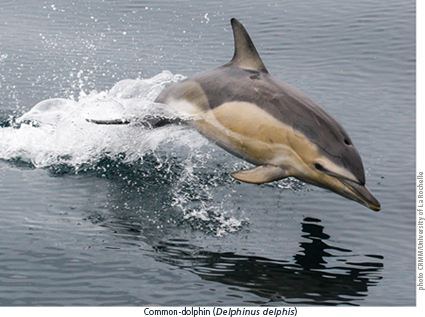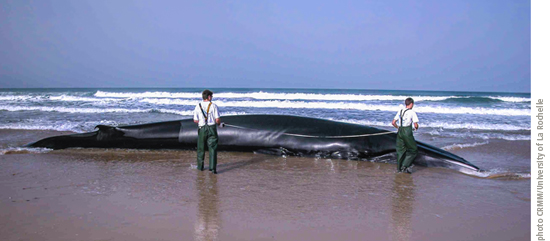
In the marine world, high-energy prey make for high-energy predators. And to survive, these marine predators need to sustain the right kind of high-energy diet. Not just any prey will do, suggests a new study by researchers from the University of British Columbia and University of La Rochelle, in France.
Published in the online journal PLOS ONE, the study is the first to show that the survival of whales and dolphins depends on the quality of their diets, which has implications for fisheries management and marine conservation.
“The conventional wisdom is that marine mammals can eat anything,” says co-author Andrew Trites, from the University of British Columbia. “However, we found that some species of whales and dolphins require calorie rich diets to survive while others are built to live off low quality prey—and it has nothing to do with how big the whales and dolphins are.”
The team compared the diets of 11 species of whales, dolphins and porpoises in the Northeast Atlantic Ocean, and found differences in the qualities of prey consumed that could not be explained by the different body sizes of the predators. The key to understanding the differences in their diets was to look at their muscle performance.
“High energy prey tend to be more mobile, and require their predators to spend more energy to catch them,” says Trites. “The two have co-evolved.”

A beached fin-whale (Balaenoptera physalus) being
measured by members of the French Stranding Network.
Jérôme Spitz from the University of La Rochelle in France, the study’s first author, says the research will help assess the impact of resource changes to marine mammals.
“Species with high energy needs are more sensitive to depletion of their primary prey,” says Spitz, now a post-doctoral fellow at the University of British Columbia. “It is no longer a question of how much food do whales and dolphins need, but whether they are able to get the right kinds of food to survive.”
March 27, 2013
PUBLICATION:[webref_bio title=”Cost of living dictates what whales, dolphins and porpoises eat: the importance of prey quality on predator foraging strategies”]
